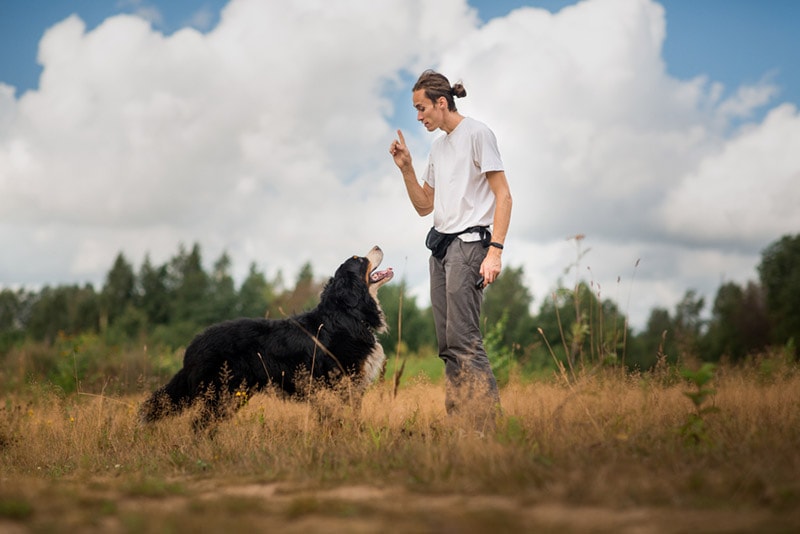Why Does My Dog Bark at Me? 6 Reasons & What to Do
Updated on

Dogs bark—it’s just what they do. They can’t speak like people, so they must instead rely on body language and vocalizations for communication. While pretty much every dog bark or makes some form of loud vocalization, some dogs are noisier than others. Innate traits in their genes help determine how noisy a dog is, though environment and socialization play a significant role as well.
Sometimes, dogs do bark a little too much, though. In these cases, figuring out why your dog is barking at you may help you lessen the barking a bit. Some breeds are just noisy, though, which can limit the amount of success you’ll have with training.
We’ll take a look at the reasons why your dog might be barking at you in this article. After that, we’ll help you lessen the barking using specific training techniques.
The 6 Reasons Why My Dog Is Barking at Me
1. Territorial Barking
While your dog can be territorial against you, this typically isn’t the case. Your dog is probably plenty used to you being in their space (unless, of course, you just adopted them). However, it isn’t uncommon for some dogs to guard people. In other words, they may bark around you because they’re trying to keep others away from you. It may also make them nervous when you do certain things, like go outside or hang around strangers. This may trigger more barking directed at you.
This type of barking is a mix of fear and aggression. The dog is scared that something is going to happen to their person, so they attempt to remedy the situation by barking.
Certain breeds are more prone to this than others. Chihuahuas are particularly prone to this behavior. However, any dog can exhibit it. Dogs that aren’t socialized properly around other people may be more likely to become scared and territorial around them.

2. Alarm Barking
Alarm barking is triggered by fear. Something scared the dog, and they’re trying to warn others or scare it away. Occasionally, their owners may scare them. If you’re dressed in unusual clothes and walking around outside the window, your dog might not recognize you and start barking. Some dogs can’t recognize their owners in masks or other facial coverings.
Usually, your dog can recognize you through scent, so this only becomes a problem when your dog can’t smell you. You may be too far away or through a window.
Most dogs will figure out it is you after only a few barks. However, this isn’t always true, depending on the dog and the circumstances. You can try talking to the dog or approaching so they can smell you in order to calm the dog down.
Dogs that are blind or deaf may be more prone to this sort of this sort of barkin. They may be startled more easily since it is easier for people to sneak up on them. You should always announce your presence clearly with these dogs, so you don’t scare them.
3. Play Barking
Many dogs bark as an indication that they want to play. They may be attempting to get your attention and initiate play. Usually, this is a happy bark that is accompanied by tail wags. Some dogs may jump or stick their butt up in the air, taking the stereotypical dog-play position. Certain dogs may also run and get a toy if they know where they are.

4. Attention Barking
Lots of dogs simply bark for attention. This is especially true when you first get home, as your dog hasn’t seen you all day. They may want to be petted or play. The basis of this bark is their need for attention. Of course, if you pay attention to your dog after they bark, this encourages barking in the future. This is a complicated situation, as you want to give your dog attention but not encourage barking.
We’ll have a complete discussion of handling attention barking in our training section.
5. Boredom Barks
Some dogs may simply bark because they are bored. If your dog is left alone or without anything to do, they may bark randomly at pretty much anything—including you. The dog may vocalize in your direction, even if they aren’t particularly looking for attention.
This type of barking is different from attention barking, though they can look the same. Dogs that are barking for attention usually can’t be distracted very easily until they get it. Dogs that are bored will happily do just about everything and are easily distracted. Giving them a puzzle toy may stop the barking, while this wouldn’t be the case of a dog looking for attention.

6. Compulsive Barking
While this is a rarer form of barking, it can be quite confusing to owners. Some dogs may have physiological problems that cause compulsive barking. When this happens, the dog barks at anything for seemingly no reason. They may seem like they bark just to bark. However, these dogs may have anxiety or a similar problem that is driving the behavior, even if you can’t see it.
How to Train Your Dog Not to Bark at You
Luckily, training your dog to bark less is often possible. All dogs are going to bark occasionally, though, so your goal shouldn’t be to prevent your canine from barking completely. Instead, you should aim to lessen the barking that you can control.
How trainable excessive barking is often depends on the reason behind it. Territorial barking and barking for attention are both easy and straightforward to prevent. However, compulsive barking may require medication and more complex training. Alarm barking is difficult to prevent, as dogs often don’t consciously think about it. It is simply a response to something that is scary.
The 6 Steps To Train Your Dog Not To Bark
1. Teach Your Dog “Quiet”
Every dog that barks excessively needs to know the “quiet” command. Whenever your dog is barking at you (or anything else, really), you should wait for them to come to a natural pause. When they do, say “quiet” and give them a treat. Eventually, they’ll put the behavior of not barking with the treat, resulting in a trained dog.
This command can be a bit harder to train than others, as you must catch your dog in the act. It can be helpful to have treats on you to reward your dog whenever they happen to go on a barking fit. If your dog tends to bark at the same time or at the same things, then you may use these to your advantage for training.
2. Teach Your Dog “Speak”
This may seem a bit backward. Why would you teach a noisy dog to “speak”? However, it can be helpful when teaching the quiet command, as you won’t have to worry about catching your dog’s barking fits. Instead, you can command your dog to bark and then use the “quiet” command as soon as they are quiet.
This is an easy way to “catch” them stopping their bark since they’re barking as you command them to.

3. Ensure Your Dog’s Needs are Met
Many of the reasons your dog may bark at you are to fulfill their needs. For instance, a dog that is barking because they are bored requires more mental stimulation. A dog that always barks because they want to play may need more physical exercise. Fulfilling these needs can prevent the barking before it even starts.
If your dog needs more physical exercise, take them on long walks. Alternatively, some dogs may have very little stamina but still need to run around quite a bit. These dogs may benefit from many relatively short walks or play sessions. Greyhounds and Siberian Huskies are good examples of this.
For mental stimulation, provide puzzle toys or do more training sessions with your canine. Many dog breeds are intelligent and need something to do with their minds, or they’ll get bored. If you aren’t home, puzzle toys are an easy way to combat this. For times that you are home, try training or even games like hide-and-seek.
4. Check for Medical Problems
If training doesn’t work and your canine’s needs seem met, the barking may be caused by an illness. Pain is a common reason for dogs to bark. They may seem to bark like they need something, though their needs are currently met. However, dogs are equally as likely to be quiet and lethargic when in pain. It depends on the dog.
Dogs can develop dementia when they get older, which can cause excessive vocalizations. They may bark because they are confused or think they’re lost. There are simple lifestyle changes you can make to help these older dogs feel more comfortable, which should reduce the barking.
Certain brain problems can also cause confusion, which can lead to barking randomly. The dog may give an alarm bark for seeming no reason, or they may bark to fulfill needs that were just met. For instance, a dog with dementia or other brain problem may bark to go outside after they just came back in. Or, they may bark for a meal after they were just fed.
Anxiety can also cause excessive barking for seemingly no reason. This problem can be treated with both medication and behavioral training.

5. Socialize Your Dog More
Canines that often alarm bark or are territorial of you may benefit from increased socialization. These behaviors are often driven by fear of the unknown. The idea of socialization is that you’re making the dog more comfortable with the world, which makes it less unknown. If your dog is used to many strangers coming near you, they may not be so territorial when it happens.
Of course, you should be careful when socializing a fearful dog. Biting is often caused due to fear. We recommend working with a trainer individually, which will help introduce your dog to the world and then moving to group classes.
6. Ignore Your Dog
If your dog attention barks often, you will need to ignore them when they start barking. You should never reward attention barking, as it just teaches your canine that they can get attention through barking. Instead, you should only pet them when they stop barking—whether this is because of a natural pause or because you use the “quiet” command.

Featured Image Credit: dahancoo, Pixabay












